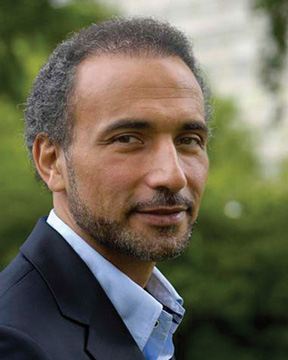Renowned philosopher, academic and political commentator Tariq Ramadan appeared at the Palais des Congres in Montreal on Sept. 8 to discuss the implications of the recent mass murders in Norway.
As the Islamic thinker and Oxford professor addressed the crowd of several hundred, it seemed as if there were just as many tourists in attendance as Montrealers for a presentation that coincided with the end of Islamic evening prayer held inside the hall.
It was quite an interesting mood-setter for the crowd, as they walked into one of the larger halls in the Salle Montrealais to be greeted by the sounds and sights of daily devotion that can be heard through the rest of the world but exists outside of the consciousness of so many Canadians.
Maybe it was necessary in a way, emphasizing that an open mind would be required to absorb the full meaning of Ramadan’s talk, but a realization that the ideas presented by him are — while differing from prevailing Western views — realities that exist throughout the world.
To disagree with these perspectives is one thing, but to pretend that they don’t exist or that they have no relevance is simply feigning ignorance, and Ramadan’s discussions are not for the ignorant.
He opened the evening by explaining there are world circumstances occurring which affect us all. These same occurrences are having different effects for the Arab world, where we have the legacies of the Spring Revolution, while for the West, they could be found in the attacks that took place in Norway on July 22, 2011, when extreme right-wing, white supremacist Anders Behring Breivik killed 77 and injured 96.
Ramadan explained that there are three important factors that the Norway tragedy shows the West, which it must address:
• As the West feels it is under threat there is an increase of violence and insecurity from the West which equals instability.
• Prejudice in government, in particular immigration, leads to the entrenchment of a growing difference between the perceptions in the minds of westerners and reality.
• Believing in false Muslim stereotypes and perpetuating a misdefinition of Islam increases the ignorance and distance between community members.
Ramadan said the foundations for addressing these problems were best found in a law-abiding, secular state. “Secular”, as Ramadan defined it, meant a state with no religious persecution, open or hidden. “Secular” could not mean a state where religion would be abolished.
He also, over the course of the two-hour lecture, spoke highly of the concept of setting the standards for an International Moral Citizenship, something that resounded much like Canadian journalist Murray Dobbin’s concept of Intentional Citizens.
Ramadan’s prescription for life was simple: Live, don’t hide your faith or beliefs.
Ramadan described how to apply this prescription in Canada.
“I think Canadians have to read more. You have to immerse yourself in all culture — sports, arts, literature. Rap culture, Internet culture, this is not culture, this is ignorance.”
This could be seen as quite an interesting comment from someone who has so successfully used the Internet at as communications tool and message-spreading utility. And for Muslim-Canadians, Ramadan had a particular message that applies to all Canadians.
“Do not accept to be self-isolated or self-marginalized — Be patient, things are not negative.”
When it came to discussing the media outlook in North America, particularly from the mainstream, Ramadan warned us that we must change the way we interpret the news itself. We must stop taking the news we have reported to us for granted, as “gospel”, and become more like media watchdogs: thinking about what is reported to us and not just accepting.
Ramadan blamed the mainstream western media for perpetuating what he called the “Distraction Theory”, whereby each nation is allocated one controversy to occupy consciousness and divert attention from everyday problems. As soon as the people’s attention returns to their everyday problems, another controversy is thrown into the spotlight.
After an extended question and answer session, Ramadan thanked the Montreal crowd, many in attendance coming from France, the Middle East and Northern Africa to hear him speak, and moved on to sign copies of his latest book, The Quest for Meaning. The book is meant to be a study on how to apply a philosophy of pluralism in today’s reality, when so many people are living in and experiencing different realities.
Ramadan said that we must be very watchful of our protectionist-leaning government if it tries to cut immigration ties or social spending. The tragic events that unfolded in Norway are liable to occur here if we allow our government to follow the path of the national policies in Europe that lead to prejudice and fear-mongering.
So while we weigh the dilemma of applying that prescription with little option in the face of a right-leaning majority government, maybe we should realize Ramadan’s other, more achievable prescription: Live, don’t hide your faith or beliefs.
Tariq Jeeroburkhan is a Montreal-based freelance journalist.



